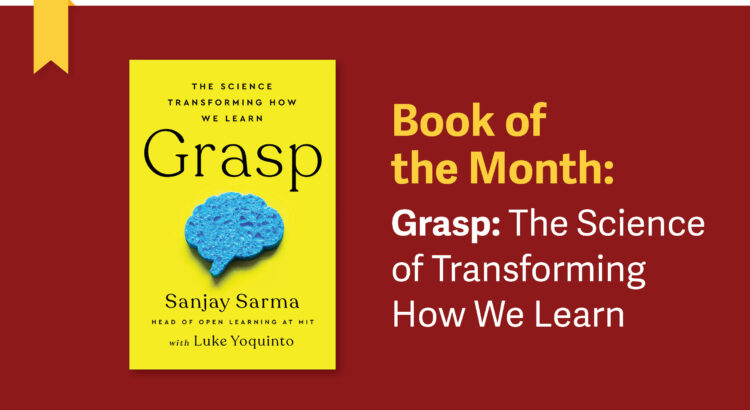Grasp: The Science of Transforming How We Learn (2020)
By Sanjay Sarma with Luke Yoquinto. Published by Anchor Books
Do you find yourself questioning the effectiveness of traditional teaching strategies, like lectures and textbooks? Wondering how to embrace technology and use it as a tool to enhance your instructional methods? Looking for a quickstart guide?
Enter Grasp: The Science of Transforming How We Learn, which challenges traditional notions of learning and presents innovative approaches to optimize educational experiences. Written in accessible language and offering practical approaches, Grasp serves as a valuable resource for students, educators, or anyone interested in optimizing their learning abilities and staying ahead in a rapidly evolving world.
Head of Open Learning at MIT, Sanjay Sarma, and science writer Luke Yoquinto, use their experience and knowledge to draw on extensive research from neuroscience, psychology, and education to delve into the complexities of the human brain and reveal the intricate processes involved in acquiring knowledge and skills. Through engaging narratives and real-life examples, the book unravels the mysteries of memory, attention, motivation, and metacognition, shedding light on how these cognitive functions influence our learning outcomes.
Key Takeaways
Some of the concepts explored in this book include:
- Retrieval practice, emphasizing the importance of actively recalling information as a means to solidify memory and promote long-term retention.
- The power of interleaving, which involves alternating between different topics or skills during study sessions, enhancing our ability to make connections and transfer knowledge across contexts.
- The role of feedback, spacing, and emotion in the learning process, providing evidence-based strategies to leverage these factors for improved learning outcomes.
- Active Learning. Through the use of simulations, virtual reality, and gamification, students are now able to explore complex concepts in a hands-on, experiential way that was previously impossible.
Overall, Grasp is a must-read for anyone interested in the future of education and the impact of technology on learning and development. The authors’ insights and vision for the future are sure to inspire and challenge readers, and provide valuable insights for educators, students, and parents alike.
You can find this book in our TCDC library! Visit us on the second floor of the C-Building at C201 or email us at tcdc@langara.ca

